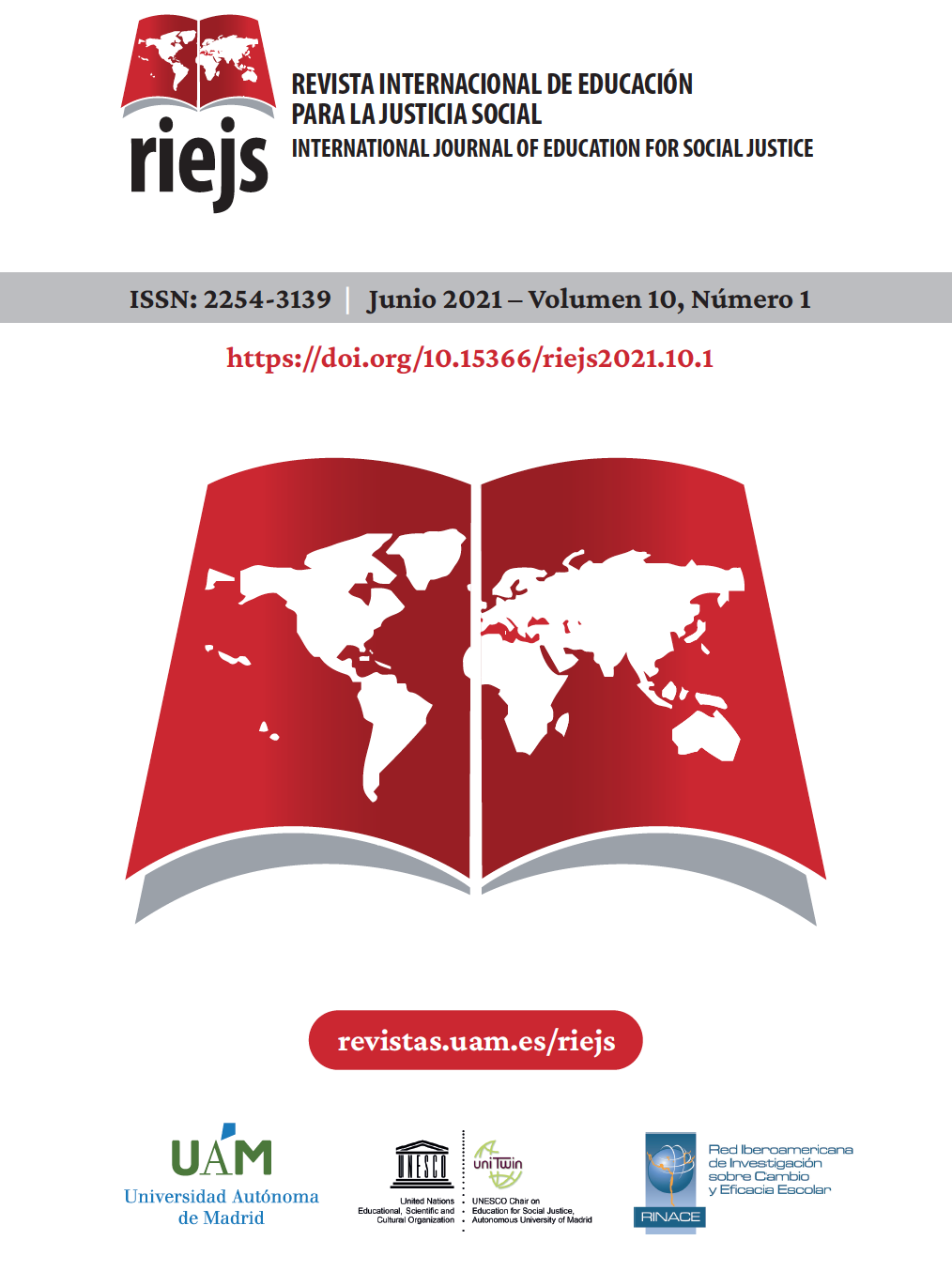Fondos de Conocimiento para la Justicia Social. Alianzas Familia-Escuela para la Transformación Educativa
Palavras-chave:
Fondos de conocimiento, Justicia social, Escuela, Familia, Educación
Este trabalho encontra-se publicado com a Licença Internacional Creative Commons Atribuição-NãoComercial-SemDerivações 4.0.
Resumo
Este número monográfico surge en el marco del proyecto titulado: “Inclusión y mejora del aprendizaje a través de la contextualización educativa. Avances en la aproximación de los Fondos de conocimiento e identidad”, financiado por el Ministerio de Economía, Industria y Competitividad (MINECO), la Agencia Estatal de Investigación (AEI) y el Fondo Europeo de Desarrollo Regional (FEDER, UE) (referencia: EDU2017-83363-R); así como en el contexto e impulso de la red internacional “Funds of Knowledge Alliance” (https://fundsofknowledge.org).
Downloads
Referências
Belavi, G. y Murillo, F. J. (2020). Democracia y justicia social en las escuelas: Dimensiones para pensar y mejorar la práctica educativa. REICE. Revista Iberoamericana sobre Calidad, Eficacia y Cambio en Educación, 18(3), 5-28. https://doi.org/10.15366/reice2020.18.3.001
Brown, K. y Cole, M. (2001). A utopian methodology as a tool for cultural and critical psychologies: Toward a positive critical theory. En M. J. Packer y M. B. Tappan (Eds.), Cultural and critical perspectives on human development (pp. 41-66). Sunny Press.
Esteban-Guitart, M. (2012). Towards a multimethodological approach to identification of funds of identity, small stories and master narratives. Narrative Inquiry, 22(1), 173-180. https://doi.org/10.1075/ni.22.1.12est
Esteban-Guitart, M. (2016). Funds of identity: Connecting meaningful learning experiences in and out of school. Cambridge University Press.
Esteban-Guitart, M. (2021). Advancing the funds of identity theory: A critical and unfinished dialogue. Mind, Culture and Activity. https://doi.org/10.1080/10749039.2021.1913751
Esteban-Guitart, M. y Moll, L. (2014a). Funds of identity: A new concept based on funds of knowledge approach. Culture and Psychology, 20(1), 31-48. https://doi.org/10.1177/1354067X13515934
Esteban-Guitart, M. y Moll, L. (2014b). Lived experiences, funds of identity and education. Culture and Psychology, 20(1), 70-81. https://doi.org/10.1177/1354067X13515940
Esteban-Guitart, M. y Vila, I. (Coord.) (2013). Experiencias en educación inclusiva: Vinculación familia, escuela y comunidad. Horsori.
Esteban-Guitart, M., Lalueza, J. L., Zhang-Yu, C. y Llopart, M. (2019). Sustaining students’ cultures and identities. A qualitative study based on the funds of knowledge and identity approaches. Sustainability, 11(12), 34-47. https://doi.org/10.3390/su11123400
Giroux, H. (2015). Pedagogías disruptivas y el desarrollo de la justicia social bajo regímenes neoliberales. Revista Internacional de Educación para la Justicia Social, 4(2), 13-27. https://doi.org/10.15366/riejs2015.4.2
Fraser, N. (2003). Social justice in the age of identity politics: Redistribution, recognition, and participation. En N. Fraser y A. Honneth (Eds.), Redistribution or recognition? A political-philosophical exchange (pp. 57-109). Verso.
González, N. y Moll, L. C. (2002). Cruzando el puente: Building bridges to funds of knowledge. Educational Policy, 16(4), 623-641. https://doi.org/10.1177/0895904802016004009
González, N., Moll, L. C. y Amanti, C. (2005). Funds of knowledge: Theorizing practices in households, communities, and classrooms. Routledge.
Hogg, L. (2011). Funds of knowledge: An investigation of coherence within the literature. Teaching and Teacher Education, 27(3), 666-677. https://doi.org/10.1016/j.tate.2010.11.005
Hogg, L. y M. Volman (2020). A synthesis of funds of identity research: Purposes, tools, pedagogical approaches and outcomes. Review of Educational Research, 90(6), 862-895. https://doi.org/10.3102/0034654320964205
Iglesias Vidal, E., González-Patiño, J., Lalueza, J. L. y Esteban-Guitart, M. (2020). Manifiesto en tiempos de pandemia: Por una educación crítica, intergeneracional, sostenible y comunitaria. Revista Internacional de Educación para la Justicia Social, 9(3), 181-198. https://doi.org/10.15366/riejs2020.9.3.010
Jovés, P., Siqués, C. y Esteban-Guitart, M. (2015). The incorporation of funds of knowledge and funds of identity of students and their families into educational practice: A case study from Catalonia, Spain. Teaching and Teacher Education, 49, 68-77. https://doi.org/10.1016/j.tate.2015.03.001
Levitas, R. (2013). Utopia as method: The imaginary reconstitution of society. Springer.
Lorenzo-Moledo, M., Míguez-Salina, G. y Cernadas-Ríos, F. (2020). ¿Pueden contribuir los fondos de conocimiento a la participación de las familias gitanas en la escuela? bases para un proyecto educativo. Teoría de la Educación, 32(1), 191-211. https://doi.org/10.14201/teri.21299.
Llopart, M. y Esteban-Guitart, M. (2018). Funds of knowledge in 21st century societies: Inclusive educational practices for under-represented students. A literature review. Journal of Curriculum Studies, 50(2), 145-161. https://doi.org/10.1080/00220272.2016.1247913
Llopart, M., Vilagran, I., Güell, C. y Esteban-Guitart, M. (2017). Las visitas etnográficas a los hogares de los estudiantes como estrategia para crear lazos de confianza entre docentes y familias. Pedagogia i Treball Social, 6(1), 70-95.
Moll, L. (2019). Elaborating funds of knowledge: Community-oriented practices in international contexts. Literacy Research: Theory, Method and Practice, 68(1), 130-138. https://doi.org/10.1177/2381336919870805
Moll, L., Amanti, C., Neff, D. y González, N. (1992). Funds of knowledge for teaching: Using a qualitative approach to connect homes and classrooms. Theory into Practice, 31(2), 132-141. https://doi.org/10.1080/00405849209543534
Montfort, N. (2017). The future. The MIT Press.
Moss, P. (2014). Transformative change and real utopias in early childhood education: A story of democracy, experimentation and potentiality. Routledge.
Murillo, F. J. y Hernández, R. (2014). Liderando escuelas justas para la justicia social. Revista Internacional de Educación para la Justicia Social, 3(2), 13-32.
Oughton, H. (2010). Funds of knowledge, a conceptual critique. Studies in the Education of Adults, 42(1), 63-78. https://doi.org/10.1080/02660830.2010.11661589
Paris, D. (2012). Culturally sustaining pedagogy: A needed change in stance, terminology, and practice. Educational Researcher, 41(3), 93-97. https://doi.org/10.3102/0013189x12441244
Saubich, X. y Esteban-Guitart, M. (2011). Bringing funds of family knowledge to school: The living Morocco project. Multidisciplinary Journal of Educational Research, 1(1), 79-103. https://doi.org/10.4452/remie.2011.04
Subero, D., Vila, I. y Esteban-Guitart, M. (2015). Some contemporary forms of the funds of knowledge approach. Developing culturally responsive pedagogy for social justice. International Journal of Educational Psychology, 4(1), 33-53. https://doi.org/10.4471/ijep.2015.02
Valencia, R. R. (2010). Dismantling contemporary deficit thinking: Educational thought and practice. Routledge.
Wright, E. O. (2010). Envisioning real utopias. Verso.
Zipin, L. y Brennan, M. (2021). Ethical vexations that hang “knowledge questions” for curriculum. En B. Green, P. Roberts y M. Brennan (Eds), Curriculum challenges and opportunties in a changing world. Transnational perspectives in curriculum inquiry (pp. 173-193). Palgrave.

